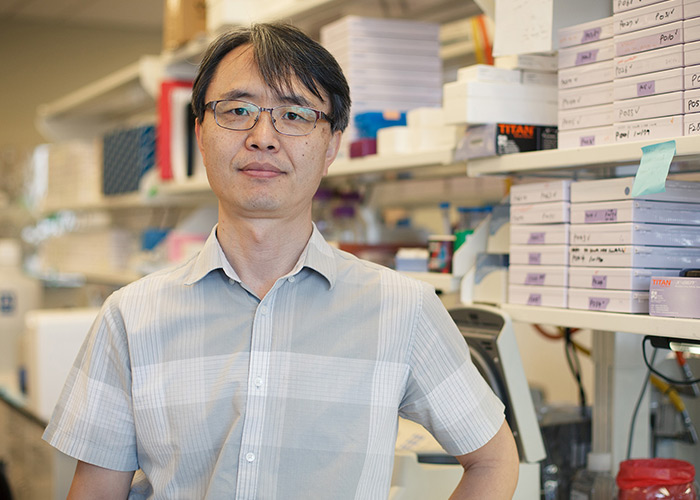UH Researcher Exploring Cancer Cures with CPRIT Funding
University of Houston researcher, Sanghyuk Chung, received a grant from the Cancer Prevention & Research Institute of Texas (CPRIT), the organization that funds groundbreaking cancer research and prevention programs in the state.
 Sanghyuk Chung, associate professor of biology and biochemistry, is examining estrogen
and defining molecular targets for the treatment of cervical cancer.CPRIT awarded $811,617 to Chung, an associate professor of biology and biochemistry
in the Center for Nuclear Receptors and Cell Signaling, to define molecular targets
for the treatment of cervical cancer.
Sanghyuk Chung, associate professor of biology and biochemistry, is examining estrogen
and defining molecular targets for the treatment of cervical cancer.CPRIT awarded $811,617 to Chung, an associate professor of biology and biochemistry
in the Center for Nuclear Receptors and Cell Signaling, to define molecular targets
for the treatment of cervical cancer.
Although cervical cancer is the fourth leading cause of cancer death in women worldwide, there has been little progress in the treatment of it over the past decade.
Chung is set to change that as he uses his CPRIT award to delve into a little-researched topic – the role of estrogen in the development of cervical cancer.
“It is clearly demonstrated that human papillomavirus (HPV) is required for the development of cervical cancer, but evidence indicates that other co-factors are required for cervical cancer,” Chung said.
Suspect number one, he said, is estrogen, the main female hormone known to cause breast cancer.
“It has been reported that our models that are genetically engineered to express HPV genes develop cancer when treated with estrogen,” said Chung, leading him to believe the role of estrogen and estrogen receptor alpha is significant.
In particular, Chung is examining stromal cells, those that surround the cancer cells and form a micro environment for them. Preliminary results suggest that estrogen receptor alpha expressed in stromal cells rather than cancer cells is required for the genesis and growth of cervical cancer.
“Estrogen receptor alpha in the stromal cells activate multiple molecular pathways, and we want to find which pathway is responsible for growth of the cancer cells. If we find it, we can inhibit that pathway,” Chung said.
If he can block the pathway, then he will have found the way to treat patients and create the first targeted therapy for cervical cancer.
“I believe it will help a lot of women worldwide,” Chung said. That’s his goal, and he adds that it might not happen without CPRIT.
“We are so lucky in Texas. No other state has a public program like CPRIT that supports cancer research and attracts prominent cancer researchers to do this kind of meaningful work.”
- Laurie Fickman, University Media Relations